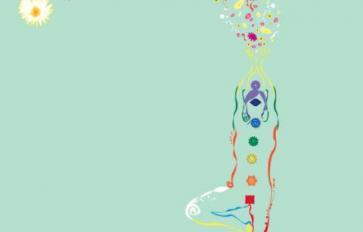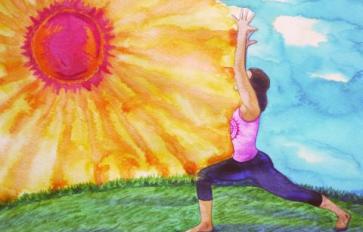
On first glance, this principle may seem straightforward. From a young age, we are encouraged to share rather than take. We witnessed shoplifters get caught, burglars go to jail, and infidelity break marriages. The action of stealing is evident. Yet the subtler forms of stealing through intent and thought are often hidden in our habits, so deep that they are disguised. Asteya is the third Yama or self-restraint of Patanjali’s Yamas and Niyamas.
We have come to understand that yoga is present in every living, breathing moment. It is a body of knowledge, a practice, and a way of life. It dwells in many aspects of our daily existence, such as how we see the world, the words we use, the ways we relate, the choices we make, and ultimately how we move and act to shape our experience. Its presence is subtle and permeating. As we begin to understand the greater framework of yoga, we can look to the Yamas and Niyamas. These are moral codes of conduct, the restraints and observances that guide the pursuit of happiness, alleviate suffering, and invite integrity into being.
Asteya in Sanskrit translates to “non-stealing.” We are familiar with its literal meaning. But even then, stealing in action can be overlooked. Ask yourself these questions: have you ever been late to an appointment? Do you overcommit or say “yes” to more than you can? Do you bag your groceries in plastic? Have you purchased bottled water? Have you picked a flower without asking the Earth? If you answer “yes” to any of these questions, you might have been stealing without realizing it. Don’t worry, that does not make you a bad person.Your actions were not of mal-intent. But simply bringing awareness to these actions can help bring more harmony to relationships—with others and our Earth. In our fast-paced society, time is precious and disrespecting others’ time is a form of taking. When we spread ourselves too thin, we take away from our own capacity to be healthy, abundant, and able to give. In many indigenous cultures, Curanderas and medicine folks will ask the Earth and plants if they may harvest before they take. Often reciprocity is part of the ritual, with an offering of tobacco, a strand of hair, or another form of gratitude. We live in a world of relationship and connection. We may appear as individuals but we function as a collective. Nature has its systems and we are nature. One of the inherent practices of Asteya is that of energetic exchange and reciprocity. Before you take, ask what you can give.
Have you been drained by an energy vampire? Have you transformed into one after a very very very very very bad day? It’s a real thing. Sometimes we can feel so overwhelmed with our emotions, feelings, and frustrations that they bring us into tunnel vision. And with all tunnel vision, a tuning out happens. In a venting frenzy, we may not realize that our spouse, friend, or child may be depleted by this spiraling of energy. Energy travels on subtle planes. As humans, we are biologically wired to connect. It is natural that a transcendence of energy and even emotion can be shared between two individuals. Think about empathy and compassion. Did you know that smiling and frowning are contagious? Neuroscience explains that “we tend to mimic the smiles and frowns of others because it helps us better understand what other people are feeling, allowing us to respond appropriately.” And by the way, smiling stimulates your serotonin levels, which makes you feel happier—just a thought to keep in mind next time you feel a bit defeated.
Let’s take Asteya a level deeper—thought. Have you compared yourself to another, perhaps in competition for a job, promotion, or on social media? Have you thought that you are not enough? Have you uttered the words “I can’t”? Thought is a form of energy. When we think something, we send our awareness towards that thought. It is the principle of how prana—our life force—flows. The more we direct awareness to a thought, the more we feed it and the greater power it wields. Anytime you have pinned yourself up for comparison—be it above or below—someone is cheated. Alan Watts has this beautiful quote: “Everybody is ‘you’. Everybody is ‘I’. That’s our name. We all share that.” The sentiment of “not enough” hits home for many, myself included. Expectation can become a form of violence—breaching the first yama of Ahimsa—especially when expectation is unrealistic. When we think we are not enough, we are stealing from our fullness, our everything-ness, and our potential. Not enough diminishes the abundance we do have and strips it into dissatisfaction, which feeds desire and wanting, and leads us back to thinking we aren’t or do not have enough. It’s a vicious cycle. Stop! Anytime you say “I can’t” you limit your own potential and steal from your future.
Now here is the flipside of the action coin—have you ever not asked for that raise or promotion, the vacation time off, or the quality time with a loved one? We have looked at how forms of stealing manifest in action and thought, but have you considered inaction as a form of stealing? Often we don’t ask because we don’t want to burden. Fear can stop us in our tracks. We rationalize and conjure up a million reasons not to. Yet, here is an opportunity to practice courage. Positive psychologist Brené Brown writes, “Courage starts with showing up and letting ourselves be seen.” Courage is a form of self-love and personal power. It is a way for us to respect our self-worth and value.
As we explore the manifestations of stealing, we discover that gratitude is the medicine for desire. Gratitude creates abundance. When we trace back through the Yamas, we begin to see how they work together, encouraging us to live a life of integrity and love. Asteya relies on Satya, the principle of truthfulness. We must be honest with our actions and thoughts. Bringing awareness to them is not always comfortable, but it bears the growth toward a more harmonious life. Both Asteya and Satya rely on love—Ahimsa. In the end of the day, we can ask ourselves the question: do our actions and thoughts bring more love into our lives?








